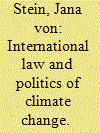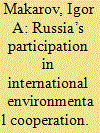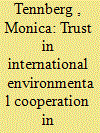| Srl | Item |
| 1 |
ID:
080978


|
|
|
|
|
| Publication |
2008.
|
| Summary/Abstract |
A considerable challenge for the creators of international environmental agreements is how to design mechanisms that deter defection without deterring participation. Relatively ``soft'' law often garners widespread participation, but it creates few concrete incentives for states to improve behavior. ``Harder'' commitments make shirking more difficult, but these institutional features may deter from joining the very states whose practices are least consistent with the treaty's requirements. Empirical analyses of ratification of the core agreements of the climate change regime support these propositions. Flexibility provisions provide one mechanism for states to mitigate this dilemma. The findings with regard to one flexibility mechanism strongly support this argument. The results with regard to a second flexibility mechanism, however, tend to follow an opposite pattern. The author offers a preliminary interpretation of this finding. Finally, this article provides insight into how international social networks and the strength of domestic nongovernmental organizations affect ratification
|
|
|
|
|
|
|
|
|
|
|
|
|
|
|
|
| 2 |
ID:
148720


|
|
|
|
|
| Summary/Abstract |
While environmental issues attract growing interest all over the world Russia has kept aside from this trend for a long time. Its participation in international environmental cooperation has always been determined primarily by the external policy’s objectives. In Soviet times, participation in global environmental initiatives was a channel of collaboration with the West. In the 1990s, it was a means of integration into the international community and one of the major areas of cooperation with the US. In the 2000s, Russia used the environmental agenda for gaining trade-offs from Western partners along with attraction of foreign investment. At present, the understanding of possibilities to reap benefits from the country’s natural capital is strengthening among Russian political and business elites. As a result, Russia’s involvement in international environmental cooperation may stir up in the near future.
|
|
|
|
|
|
|
|
|
|
|
|
|
|
|
|
| 3 |
ID:
078782


|
|
|
|
|
| Publication |
2007.
|
| Summary/Abstract |
In this article, I discuss trust and its manifestations in international environmental cooperation. A lack of trust in the capacity of states and other actors to tackle environmental issues leads to international environmental insecurity. Awareness of such incapacities is widespread and is increasing in `modern risk societies'. Trust is often understood as the rational and intentional efforts of parties to treat one another as trustworthy counterparts and to ignore discretion, but it is also habitual. Trust is based on the socialization of agents into certain practices. The importance of trust and its different dimensions emerged as the central theme in a study of international environmental cooperation in northwestern Russia. Russian and Nordic participants were interviewed in the winter 2003-2004 and spring 2006 with the aim of gathering their views and experiences on cooperation. The interviewees were mainly representatives of regional and national administrations and non-governmental organizations. In addition, in the autumn of 2004 and again in the autumn of 2006, a questionnaire was sent to project managers working in northwestern Russia. The article highlights the importance of the institutional dimension of trust in terms of trust in abstract expertise and monetary systems as well as trust in the representatives of such systems. Both trust and the lack of trust remain important issues, especially in regard to the Russian capacity to develop domestic environmental policies and to improve the status of Russia in international environmental cooperation
|
|
|
|
|
|
|
|
|
|
|
|
|
|
|
|